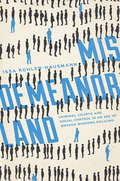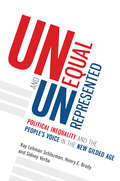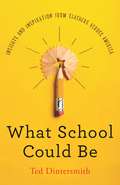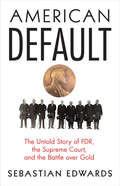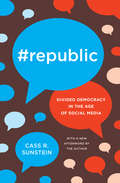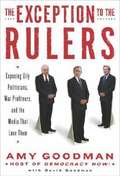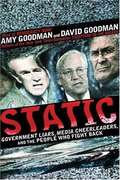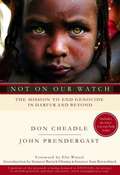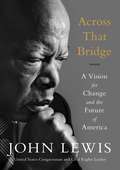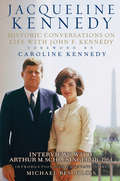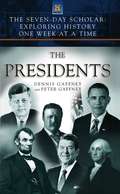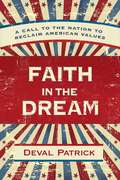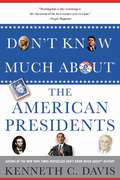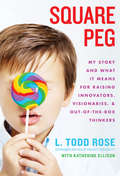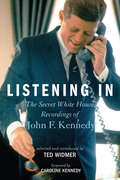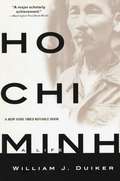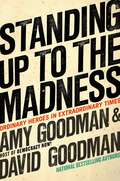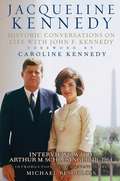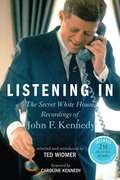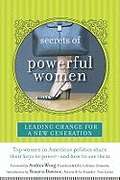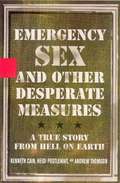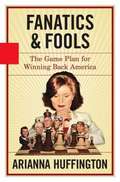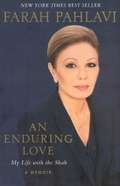- Table View
- List View
Misdemeanorland: Criminal Courts and Social Control in an Age of Broken Windows Policing
by Issa Kohler-HausmannAn in-depth look at the consequences of New York City’s dramatically expanded policing of low-level offensesFelony conviction and mass incarceration attract considerable media attention these days, yet the most common criminal-justice encounters are for misdemeanors, not felonies, and the most common outcome is not prison. In the early 1990s, New York City launched an initiative under the banner of Broken Windows policing to dramatically expand enforcement against low-level offenses. Misdemeanorland is the first book to document the fates of the hundreds of thousands of people hauled into lower criminal courts as part of this policing experiment.Drawing on three years of fieldwork inside and outside of the courtroom, in-depth interviews, and analysis of trends in arrests and dispositions of misdemeanors going back three decades, Issa Kohler-Hausmann argues that lower courts have largely abandoned the adjudicative model of criminal law administration in which questions of factual guilt and legal punishment drive case outcomes. Due to the sheer volume of arrests, lower courts have adopted a managerial model--and the implications are troubling. Kohler-Hausmann shows how significant volumes of people are marked, tested, and subjected to surveillance and control even though about half the cases result in some form of legal dismissal. She describes in harrowing detail how the reach of America's penal state extends well beyond the shocking numbers of people incarcerated in prisons or stigmatized by a felony conviction.Revealing and innovative, Misdemeanorland shows how the lower reaches of our criminal justice system operate as a form of social control and surveillance, often without adjudicating cases or imposing formal punishment.
Unequal and Unrepresented: Political Inequality and the People's Voice in the New Gilded Age
by Sidney Verba Kay Schlozman Henry BradyHow American political participation is increasingly being shaped by citizens who wield more resourcesThe Declaration of Independence proclaims equality as a foundational American value. However, Unequal and Unrepresented finds that political voice in America is not only unequal but also unrepresentative. Those who are well educated and affluent carry megaphones. The less privileged speak in a whisper. Relying on three decades of research and an enormous wealth of information about politically active individuals and organizations, Kay Schlozman, Henry Brady, and Sidney Verba offer a concise synthesis and update of their groundbreaking work on political participation. The authors consider the many ways that citizens in American democracy can influence public outcomes through political voice: by voting, getting involved in campaigns, communicating directly with public officials, participating online or offline, acting alone and in organizations, and investing their time and money. Socioeconomic imbalances characterize every form of political voice, but the advantage to the advantaged is especially pronounced when it comes to any form of political expression--for example, lobbying legislators or making campaign donations—that relies on money as an input. With those at the top of the ladder increasingly able to spend lavishly in politics, political action anchored in financial investment weighs ever more heavily in what public officials hear. Citing real-life examples and examining inequalities from multiple perspectives, Unequal and Unrepresented shows how disparities in political voice endanger American democracy today.
What School Could Be: Insights and Inspiration from Teachers across America
by Ted DintersmithAn inspiring account of ordinary teachers who are doing extraordinary things that could transform educationWhat School Could Be offers an inspiring vision of what our teachers and students can accomplish if trusted with the challenge of developing the skills and ways of thinking needed to thrive in a world of dizzying technological change.Innovation expert Ted Dintersmith took an unprecedented trip across America, visiting all fifty states in a single school year. He originally set out to raise awareness about the urgent need to reimagine education to prepare students for a world marked by innovation--but America's teachers one-upped him. All across the country, he met teachers in ordinary settings doing extraordinary things, creating innovative classrooms where children learn deeply and joyously as they gain purpose, agency, essential skillsets and mindsets, and real knowledge. Together, these new ways of teaching and learning offer a vision of what school could be—and a model for transforming schools throughout the United States and beyond. Better yet, teachers and parents don't have to wait for the revolution to come from above. They can readily implement small changes that can make a big difference.America's clock is ticking. Our archaic model of education trains our kids for a world that no longer exists, and accelerating advances in technology are eliminating millions of jobs. But the trailblazing of many American educators gives us reasons for hope.Capturing bold ideas from teachers and classrooms across America, What School Could Be provides a realistic and profoundly optimistic roadmap for creating cultures of innovation and real learning in all our schools.
American Default: The Untold Story of FDR, the Supreme Court, and the Battle over Gold
by Sebastian EdwardsThe untold story of how FDR did the unthinkable to save the American economyThe American economy is strong in large part because nobody believes that America would ever default on its debt. Yet in 1933, Franklin D. Roosevelt did just that, when in a bid to pull the country out of depression, he depreciated the U.S. dollar in relation to gold, effectively annulling all debt contracts. American Default is the story of this forgotten chapter in America's history.Sebastian Edwards provides a compelling account of the economic and legal drama that embroiled a nation already reeling from global financial collapse. It began on April 5, 1933, when FDR ordered Americans to sell all their gold holdings to the government. This was followed by the abandonment of the gold standard, the unilateral and retroactive rewriting of contracts, and the devaluation of the dollar. Anyone who held public and private debt suddenly saw its value reduced by nearly half, and debtors--including the U.S. government—suddenly owed their creditors far less. Revaluing the dollar imposed a hefty loss on investors and savers, many of them middle-class American families. The banks fought back, and a bitter battle for gold ensued. In early 1935, the case went to the Supreme Court. Edwards describes FDR's rancorous clashes with conservative Chief Justice Charles Evans Hughes, a confrontation that threatened to finish the New Deal for good—and that led to FDR's attempt to pack the court in 1937.At a time when several major economies never approached the brink of default or devaluing or recalling currencies, American Default is a timely account of a little-known yet drastic experiment with these policies, the inevitable backlash, and the ultimate result.
#Republic: Divided Democracy in the Age of Social Media
by Cass R. SunsteinFrom the New York Times bestselling author of Nudge and The World According to Star Wars, a revealing account of how today's Internet threatens democracy—and what can be done about itAs the Internet grows more sophisticated, it is creating new threats to democracy. Social media companies such as Facebook can sort us ever more efficiently into groups of the like-minded, creating echo chambers that amplify our views. It's no accident that on some occasions, people of different political views cannot even understand one another. It's also no surprise that terrorist groups have been able to exploit social media to deadly effect. Welcome to the age of #Republic.In this revealing book, New York Times bestselling author Cass Sunstein shows how today’s Internet is driving political fragmentation, polarization, and even extremism--and what can be done about it. He proposes practical and legal changes to make the Internet friendlier to democratic deliberation, showing that #Republic need not be an ironic term. Rather, it can be a rallying cry for the kind of democracy that citizens of diverse societies need most.
Air Force One: A History of the Presidents and Their Planes
by Kenneth T. WalshFrom FDR's prop-driven Pan Am to the glimmering blue and white jumbo 747 on which George W. Bush travels, the president's plane has captured the public's awe and imagination, and is recognized around the world as a symbol of American power. In this unique book, Kenneth Walsh looks at the decisions that our last 12 presidents made on the plane; the personality traits and peccadilloes they revealed when their guard was down; and the way they each established a distinctive mood aboard that was a reflection of their times, as well as their individual personalities. Based on interviews with four living presidents, scores of past and present White House officials, and staff and crew members of Air Force One, Walsh's book reveals countless fascinating stories of life aboard the 'flying White House.' It also features descriptions of the food, the decor, the bedrooms, the medical clinic, and much more.
The Exception to the Rulers: Exposing Oily Politicians, War Profiteers, and the Media that Love Them
by Amy Goodman David GoodmanHost of Pacifica Radio's Democracy Now! Analyzes world events.
Static: Government Liars, Media Cheerleaders and the People Who Fight Back
by Amy Goodman David GoodmanFrom the publisher (Hyperion): In Static, the brother-sister team of Amy Goodman, host of the popular international TV and radio news show Democracy Now!, and investigative journalist David Goodman once again take on government liars, corporate profiteers, and the media that has acted as their megaphone. They expose how the Bush administration has manipulated and fabricated news and how the corporate media has worked hand in glove with the powerful to deceive the public. The Goodmans cut through the spin and static to offer the truth about war, torture, and government control of the media. Mixing investigative reporting and interviews, Static presents voices of dissidents, activists, and others who are too often frozen out of official debate, to shed new light on urgent issues of war and peace. Ultimately, Static is a hopeful, fighting rallying call for people to take back our government, our media,and our world.
Not on Our Watch: The Mission to End Genocide in Darfur and Beyond
by Don Cheadle John PrendergastIf you care about issues of genocide and other mass atrocities, but you don't know what to do to make a difference, this book was written for you.
Across That Bridge: Life Lessons and a Vision for Change
by John LewisWinner of the NAACP Image Award for Outstanding Literary Work/Biography -- in paperback for the first time.In turbulent times Americans look to the Civil Rights Movement as the apotheosis of political expression. As we confront questions of social inequality there's no better time to revisit the lessons of the '60s and no better leader to learn from than Congressman John Lewis.In Across That Bridge, Congressman Lewis draws from his experience as a leader of the Civil Rights Movement to offer timeless guidance to anyone seeking to live virtuously and transform the world. His wisdom, poignant recollections, and powerful ideas will inspire a new generation to usher in a freer, more peaceful society. The Civil Rights Movement gave rise to the protest culture we know today, and the experiences of leaders like Congressman Lewis have never been more relevant. Now featuring an updated introduction from the author addressing the current administration, Across that Bridge offers a strong and moral voice to guide our nation through an era of great uncertainty."The most important lesson I have learned in the fifty years I have spent working toward the building of a better world is that the true work of social transformation starts within. It begins inside your own heart and mind, because the battleground of human transformation is really, more than any other thing, the struggle within the human consciousness to believe and accept what is true. Thus to truly revolutionize our society, we must first revolutionize ourselves. We must be the change we seek if we are to effectively demand transformation from others." ---John Lewis in Across That Bridge
Jacqueline Kennedy: Historic Conversations on Life with John F. Kennedy
by Caroline KennedyIn 1964, Jacqueline Kennedy recorded seven historic interviews about her life with John F. Kennedy. Now, for the first time, they can be read in this deluxe, illustrated eBook.Shortly after President John F. Kennedy's assassination, with a nation deep in mourning and the world looking on in stunned disbelief, Jacqueline Kennedy found the strength to set aside her own personal grief for the sake of posterity and begin the task of documenting and preserving her husband's legacy. In January of 1964, she and Robert F. Kennedy approved a planned oral-history project that would capture their first-hand accounts of the late President as well as the recollections of those closest to him throughout his extraordinary political career. For the rest of her life, the famously private Jacqueline Kennedy steadfastly refused to discuss her memories of those years, but beginning that March, she fulfilled her obligation to future generations of Americans by sitting down with historian Arthur Schlesinger, Jr., and recording an astonishingly detailed and unvarnished account of her experiences and impressions as the wife and confidante of John F. Kennedy. The tapes of those sessions were then sealed and later deposited in the John F. Kennedy Presidential Library and Museum upon its completion, in accordance with Mrs. Kennedy's wishes.The resulting eight and a half hours of material comprises a unique and compelling record of a tumultuous era, providing fresh insights on the many significant people and events that shaped JFK's presidency but also shedding new light on the man behind the momentous decisions. Here are JFK's unscripted opinions on a host of revealing subjects, including his thoughts and feelings about his brothers Robert and Ted, and his take on world leaders past and present, giving us perhaps the most informed, genuine, and immediate portrait of John Fitzgerald Kennedy we shall ever have. Mrs. Kennedy's urbane perspective, her candor, and her flashes of wit also give us our clearest glimpse into the active mind of a remarkable First Lady.In conjunction with the fiftieth anniversary of President Kennedy's Inauguration, Caroline Kennedy and the Kennedy family are now releasing these beautifully restored recordings on CDs with accompanying transcripts. Introduced and annotated by renowned presidential historian Michael Beschloss, these interviews will add an exciting new dimension to our understanding and appreciation of President Kennedy and his time and make the past come alive through the words and voice of an eloquent eyewitness to history.
The Seven-Day Scholar: The Presidents
by Dennis Gaffney Peter Gaffney"A bite of history a day, all year long . . ."Flawless storytelling, expert research, and intriguing, one-page essays make The Seven-Day Scholar: The Presidents perfect for history buffs. The Presidents addresses formative moments in the lives of the presidents, crucial political decisions, little-known facts, and insights into the intriguing individuals Americans have selected to lead our country. Each chapter includes seven related narrative entries-one for each day of the week. The book explores many fascinating facts and issues about the presidents, including: Did Washington really enjoy dancing? Why did President Jefferson avoid speaking in public? Why did Lincoln crack down on civil liberties? Why did Eisenhower fight against big defense budgets? How responsible was Reagan for the end of the Cold War? As well as covering each president, the book includes chapters on the Best and Worst Writers and Speakers; Most Controversial Elections; Scandals; Most Controversial Foreign Policy Decisions; The Peacemakers; First Ladies; The Best and Worst Presidents; and more. Entries also include follow-up resources where curious readers can learn more.Readers can sweep through the book from beginning to end, or use it as a reference book, periodically exploring topics and presidents in which they are interested.
American Freak Show: The Completely Fabricated Stories of Our New National Treasures
by Willie GeistThis is not the first book written about quantum mechanics, but it just might be the last. The theory presented inside these pages is so revolutionary that it has stunned the scientific community into reconsidering centuries of thought about the behavior of energy and matter. Prepare to have your mind blown. Sorry, that's the introduction to Willie Geist's next book--the culmination of his life's work. Look for it next spring, just in time for Mother's Day. This book is about his other passion: freaks. When he's not in the lab, Geist spends his time on MSNBC's Morning Joe sifting through the wreckage of American politics and popular culture. These days, that's a big job. With an Alaska hockey mom turning, almost overnight, into a national icon and threatening to move from Wasilla to the White House, with the world's most famous athlete now associated less with the Masters and more with the strippers, and with reality TV working around the clock to ensure the constitutional right of every man, woman, and child to fifteen minutes of fame, Geist's business is thriving. In his hilarious first book, American Freak Show, Geist takes the smart, biting observation loved by his television audience to new satirical extremes. The real-life characters who now haunt our daily lives are cast as stars in completely made-up scenes that, frankly, are not all that far from reality. Geist treats us to the first look at President Sarah Palin's unconventional inaugural address, performed live on WWE's Monday Night Raw after her renegade victory in the 2012 election. We go inside the ballroom for a Dean Martin-style welcome roast of Bernie Madoff upon his arrival in Hell, with Pol Pot serving as sidesplitting roastmaster. Geist provides us with never-before-seen FBI wiretap transcripts of the more mundane, but equally profane, telephone conversations of former Illinois governor Rod Blagojevich. And George W. Bush's batting-cage-and-waterslide-themed plans for a presidential library are laid out publicly for the first time. From Obama to Oprah, Afghanistan to Lohan, and Snooki to the Salahis, Willie Geist spares no one as our host of this wild American Freak Show. You'll laugh out loud while weeping for the future of America.
Faith in the Dream: A Call to the Nation to Reclaim American Values
by Deval Patrick"The American Dream is founded on the ideals of equality, opportunity, and fair play. These are moral reference points for Americans, matters of conscience. History has shown us time and again that these ideals are motivating. My own life, and the lives of millions of Americans through generations, has demonstrated their power. We need to stop confining our ideals to national holidays and static monuments, and bring them back into our conversations and our politics. We need to let them lead us to the right choices and away from the wrong ones. This is the essence of patriotism. As we decide what kind of country we want to live in, it is time for America's true patriots, by whatever political label, to shape the fate of the nation." Faith in the Dream is a short but powerful eBook and a call to action by one of the nation's most inspirational public figures, Massachusetts Governor Deval Patrick. Our country is at a critical crossroads and Americans of all political persuasions sense that something significant is at stake. In this first-of-its-kind eBook, designed to launch a nationwide online conversation, Governor Patrick shows how and why the American Dream itself--the ability of future generations to inherit a country and a life better, more prosperous, and more progressive than that of their forbears--is today very much up for grabs, and what we must all do to restore it. The challenges are daunting, but we cannot sink into anger, defeat, or despair; we must rise to the challenge of protecting the American Dream at all costs. Governor Patrick offers us a path for the future that is built on the best time-honored values of our past and on the powerful role that citizens can play when they come together in support of the common good. Rather than attack government, give up on it, or take it for granted, Patrick heralds our responsibility as Americans to reclaim it, and demand that political leaders stay true to our country's most fundamental values. Capitalizing on the power of our digital age, Faith in the Dream serves as a launching point for a new nationwide dialogue with readers, who are encouraged to share their thoughts and success stories at www.faithinthedream.com regarding what they, and other advocates and leaders they know, are currently doing to improve their communities and country. Offering a modern twist on the time-honored tradition of political pamphlets and perfectly timed for this election season, this is a must-read book--and a stirring invitation to participate--for anyone who cares about the fate of our nation and the sanctity of the American Dream.
Don't Know Much About® the American Presidents
by Kenneth C. DavisWhich president broke the law to prevent enslaved people from being freed? Who said, "When the president does it,that means it's not illegal"? Why does America have a president? From the heated debates among the framers of the Constitution in 1787 over an "elected king," to the creation of the presidency, and on through rich profiles of each man who has held the office, New York Times bestselling author Kenneth C. Davis takes readers on a guided tour of American history. Examining each chief executive, from the low lights to the bright lights, the memorable to the forgettable and the forgotten, Davis tells all the stories, offering rich anecdotes about real people. He also charts the history of the presidency itself, debunking myths and grading the presidents from A+ to F. For history buffs and history-phobes alike, this entertaining book may change your understanding of the highest office in the land throughout more than two hundred years of history.
Square Peg: My Story and What It Means for Raising Innovators, Visionaries, and Out-of-the-Box Thinkers
by Todd RoseIn the seventh grade, Todd Rose was suspended-not for the first time-for throwing six stink bombs at the blackboard, where his art teacher stood with his back to the class. At eighteen, he was a high school dropout, stocking shelves at a department store for $4.25 an hour. Today, Rose is a faculty member at the Harvard Graduate School of Education.Square Peg illuminates the struggles of millions of bright young children--and their frustrated parents and teachers--who are stuck in a one-size-fits-all school system that fails to approach the student as an individual. Rose shares his own incredible journey from troubled childhood to Harvard, seamlessly integrating cutting-edge research in neuroscience and psychology along with advances in the field of education, to ultimately provide a roadmap for parents and teachers of kids who are the casualties of America's antiquated school system.With a distinguished blend of humor, humility, and practical advice for nurturing children who are a poor fit in conventional schools, Square Peg is a game-changing manifesto that provides groundbreaking insight into how we can get the most out of all the students in our classrooms, and why today's dropouts could be tomorrow's innovators.
Listening In: The Secret White House Recordings of John F. Kennedy
by Caroline Kennedy Ted WidmerIn July 1962, in an effort to preserve an accurate record of Presidential decision-making in a highly charged atmosphere of conflicting viewpoints, strategies and tactics, John F. Kennedy installed hidden recording systems in the Oval Office and in the Cabinet Room. The result is a priceless historical archive comprising some 265 hours of taped material. JFK was elected president when Civil Rights tensions were near the boiling point, and Americans feared a nuclear war. Confronted with complex dilemmas necessitating swift and unprecedented action, President Kennedy engaged in intense discussion and debate with his cabinet members and other advisors. Now, in conjunction with the fiftieth anniversary of the Kennedy presidency, the John F. Kennedy Library and historian Ted Widmer have carefully selected the most compelling and important of these remarkable recordings for release, fully restored and re-mastered onto two 75-minute CDs for the first time. Listening In represents a uniquely unscripted, insider account of a president and his cabinet grappling with the day-to-day business of the White House and guiding the nation through a hazardous era of uncertainty.Accompanied by extensively annotated transcripts of the recordings, and with a foreword by Caroline Kennedy, Listening In delivers the story behind the story in the unguarded words and voices of the decision-makers themselves. Listening In covers watershed events, including the Cuban Missile Crisis, the Space Race, Vietnam, and the arms race, and offers fascinating glimpses into the intellectual methodology of a circumspect president and his brilliant, eclectic brain trust. Just as the unique vision of President John F. Kennedy continues to resonate half a century after his stirring speeches and bold policy decisions, the documentary candor of Listening In imparts a vivid, breathtaking immediacy that will significantly expand our understanding of his time in office.
Ho Chi Minh: A Life
by William J. DuikerTo grasp the complicated causes and consequences of the Vietnam War, one must understand the extraordinary life of Ho Chi Minh, the man generally recognized as the father of modern Vietnam. Duiker provides startling insights into Ho's true motivation, as well as into the Soviet and Chinese roles in the Vietnam War.
Standing up to the Madness: Ordinary Heroes in Extraordinary Times
by Amy Goodman David GoodmanThe historical election of Barack Obama grew out of a movement led by courageous people who have defended our democracy in the face of an intense assault. From global warming, to global warring, to the global economic meltdown, people are challenging the powers that be. Standing Up to the Madness profiles the everyday people who are standing up for what they believe in and changing the world. This book offers hope and inspiration for anyone trying to make the world a more just and peaceful place, and includes practical information for how individuals can take action and effect change. Standing Up to the Madness not only is a timely, inspiring, and even revolutionary look at who wields the greatest power in America--everyday people who take a chance and stand up for what they believe in--but also offers advice on what you can do to help. Where are the millions marching in the streets to defend human rights, civil liberties, and racial justice? Where is the mass revulsion against the killing and torture being carried out in our name? Where are the environmentalists? Where is the peace movement? The answer: They are everywhere. The award-winning sister-brother team of Amy Goodman, host of Democracy Now!, and investigative journalist David Goodman traveled the country to detail the ways in which grassroots activists have taken politics out of the hands of politicians. Standing Up to the Madness tells the stories of everyday citizens who have challenged the government and prevailed. As the Bush administration has waged war abroad and at home, it has catalyzed a vast groundswell of political action. From African-American residents of deluged New Orleans who are fighting racism and City Hall to regain their homes; to four Connecticut librarians who refused to spy on their patrons, challenged the USA PATRIOT Act, and won; to a group of high school students who were barred from performing a play they wrote on the Iraq War based on letters from soldiers; to the first U.S. Army officer to publicly refuse orders to deploy to Iraq, charging that his duty as an officer is to refuse to fight in an illegal and immoral war, Standing Up to the Madness profiles citizens rising to extraordinary challenges. And, in the process,they are changing the way that politics is done, both now and in the future. In communities around the United States, courageous individuals have taken leaps of faith to stop the madness. They could only hope that if they led, others would follow. That is how movements are born. What begins as one, eventually becomes many. In that tradition, the authors have included the ways in which any individual can take action and effect change.
Jacqueline Kennedy: Historic Conversations on Life with John F. Kennedy
by Michael Beschloss Caroline KennedyWhile reading Arthur Schlesinger, Jr. 's interviews of Jacqueline Kennedy, readers will be able to go back in time 50 years, and feel like they are part of a conversation between two old friends. The text includes complete transcripts of Jacqueline's interviews that allows readers a window into an important time in American history; it also has accompanying annotations from leading presidential historian Michael Beschloss which informs readers on political details of the era.
Listening In: The Secret White House Recordings of John F. Kennedy
by Ted WidmerIn July 1962, in an effort to preserve an accurate record of Presidential decision-making in a highly charged atmosphere of conflicting viewpoints, strategies and tactics, John F. Kennedy installed hidden recording systems in the Oval Office and in the Cabinet Room. The result is a priceless historical archive comprising some 265 hours of taped material. JFK was elected president when Civil Rights tensions were near the boiling point, and Americans feared a nuclear war. Confronted with complex dilemmas necessitating swift and unprecedented action, President Kennedy engaged in intense discussion and debate with his cabinet members and other advisors. Now, in conjunction with the fiftieth anniversary of the Kennedy presidency, the John F. Kennedy Library and historian Ted Widmer have carefully selected the most compelling and important of these remarkable recordings for release, fully restored and re-mastered onto two 75-minute CDs for the first time. Listening In represents a uniquely unscripted, insider account of a president and his cabinet grappling with the day-to-day business of the White House and guiding the nation through a hazardous era of uncertainty. Accompanied by extensively annotated transcripts of the recordings, and with a foreword by Caroline Kennedy, Listening In delivers the story behind the story in the unguarded words and voices of the decision-makers themselves. Listening In covers watershed events, including the Cuban Missile Crisis, the Space Race, Vietnam, and the arms race, and offers fascinating glimpses into the intellectual methodology of a circumspect president and his brilliant, eclectic brain trust. Just as the unique vision of President John F. Kennedy continues to resonate half a century after his stirring speeches and bold policy decisions, the documentary candor of Listening In imparts a vivid, breathtaking immediacy that will significantly expand our understanding of his time in office.
Secrets of Powerful Women: Leading Change for a New Generation
by Andrea Wong Rosario DawsonIn 2008, 16 teenage girls won exclusive access to dozens of the most politically powerful women in America. These congresswomen, journalists, and activists were supposed to talk to the young women about leadership skills and how to impact public policy, but they couldn't help sharing much more.
Emergency Sex and Other Desperate Measures: A True Story from Hell on Earth
by Kenneth Cain Heidi Postlewait Andrew ThomsonThis book is a must read for those interested in the peace keeping activities during the 90's. Andrew, Heiddi and Ken take you through their lives starting in the U.S. to the horrors, lessons and personal experiences during these ten years.
Fanatics and Fools: The Game Plan for Winning Back America
by Arianna HuffingtonAs America's leaders fight pre-emptive wars abroad and ordinary Americans fight to keep their heads above water here at home, Arianna Huffington offers a no-holds-barred account of where we stand and a clear and remarkable vision of where we should be headed.
An Enduring Love
by Farah Pahlavi Patricia ClancyHer story began like a fairytale. At the age of, 21, Farah Diba married the Shah of Iran, Mohammed, Reza Shah Pahlavi. The world's press covered her coronation as empress. This is her autobiography. of Iran and, overnight she became an international celebrity.
